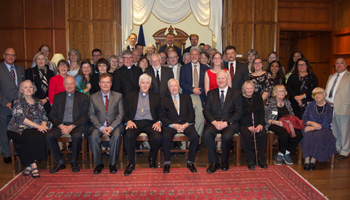‘If someone is not provided the opportunity to exercise their capability, it’s an inequality’

By Jennifer Stranges

His Excellency, the Honorable J. Michel Doyon, Lieutenant Governor of Quebec, front row, center. Dr. Bill Sullivan, front row, fourth from the right. Audrey Cole, front row, third from the right.
People living with intellectual and developmental disabilities, neurocognitive disorders, and compromised mental health are vulnerable to their fundamental rights being denied, says Audrey Cole, a keynote speaker at a recent conference on decision-making and consent in health care co-organized by a St. Michael’s Hospital doctor.
Cole, an activist, advocate, and educator, is the mother of a 55-year-old man named Ian, who lives with Down syndrome, is non-verbal and has difficulty walking independently.
Cole, who previously chaired Community Living Ontario task force, said she came away from the recent 9th International Colloquium of the International Association of Catholic Bioethics (IACB) in Quebec City feeling optimistic.
The event last month, co-organized by Dr. Bill Sullivan, a family physician with St. Michael’s Hospital’s Academic Family Health Team, was designed to highlight the exclusion of people with vulnerabilities from decision-making, including people with autism, dementia, or bipolar disorder.
Currently, when someone is assessed and deemed incapable of making decisions independently, they lose their legal capacity to make decisions. A family member or guardian absorbs their rights and becomes a substitute decision maker. The vulnerable person can lose any and all input into decisions about themselves.
“I came away from the colloquium feeling very encouraged that such an initiative had drawn the attention of so many deep-thinking, busy people,” said Cole. “I came away feeling that there was hope for a better future for all of us.”
The colloquium was a gathering of international bioethicists, physicians, and caregivers, and highlighted “supported decision-making” as a viable approach.
Supported decision-making focuses on the capabilities of a vulnerable person, as opposed to their incapacities. In supported decision-making, the vulnerable person is supported by a few people who agree to help them to come to a health care decision in keeping with their will and preferences instead of having a substitute decision maker take over the decision-making.
“Our laws on health care decision-making are geared towards distinguishing those who can from those who cannot,” says Dr. Sullivan. “Too often, people with intellectual and developmental disabilities, those with neurocognitive disorders, and those with compromised mental health find themselves excluded altogether from the process of planning their health care.”
The supported decision-making approach is endorsed by the United Nations and is one which Cole has plenty of perspective on. After all, it was her idea. In the mid-1980s, Cole founded the notion and it is now required by international law through the UN Convention on the Rights of Persons with Disabilities.
The traditional all-or-nothing approach of guardianship is discriminatory, says Cole.
“In a society that says it believes in equality, no person, legally or otherwise, should be free to replace another person as often happens in substitute decision-making.”
While it may be a relatively novel concept in health care, Cole notes supported decision-making is regular day-to-day reality for most people.
“It’s what we do automatically as human beings. We don’t call it supported decision-making simply because we have no need to do so,” says Cole.
“You and I, and everyone else whose decision-making capacity is not challenged, are free to use whatever support we need and can find from any source we choose with no questions asked and no obligation to disclose that we sought or received that support in making our decisions.”
Supported decision-making allows vulnerable people to exercise as much autonomy and control of their lives as possible, says Dr. Sullivan. Instead of being required to pass a cognitive test to determine capacity, there is focus on what support the person needs from others to exercise as much decision-making capacities as possible, which is their right.
Despite a long path forward, Dr. Sullivan left the colloquium pleased. Participants drafted a consensus statement and other resources to promote how persons with vulnerabilities can participate in health care decision-making. He hopes their work will influence legislation.
“If someone is not provided opportunities to exercise their capabilities, it’s an inequality,” says Dr. Sullivan.
About St. Michael’s Hospital
St. Michael’s Hospital provides compassionate care to all who enter its doors. The hospital also provides outstanding medical education to future health care professionals in more than 27 academic disciplines. Critical care and trauma, heart disease, neurosurgery, diabetes, cancer care, care of the homeless and global health are among the Hospital’s recognized areas of expertise. Through the Keenan Research Centre and the Li Ka Shing International Healthcare Education Centre, which make up the Li Ka Shing Knowledge Institute, research and education at St. Michael’s Hospital are recognized and make an impact around the world. Founded in 1892, the hospital is fully affiliated with the University of Toronto.
About Unity Health Toronto
Unity Health Toronto, comprised of Providence Healthcare, St. Joseph’s Health Centre and St. Michael’s Hospital, works to advance the health of everyone in our urban communities and beyond. Our health network serves patients, residents and clients across the full spectrum of care, spanning primary care, secondary community care, tertiary and quaternary care services to post-acute through rehabilitation, palliative care and long-term care, while investing in world-class research and education. For more information, visit www.unityhealth.to.
